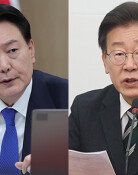Without reform, Saenuri’s hopes on Ban Ki-moon are daydream
Without reform, Saenuri’s hopes on Ban Ki-moon are daydream
Posted May. 26, 2016 07:18,
Updated May. 26, 2016 07:28
Chung Jin-suk, the floor leader of the ruling Saenuri Party, has come under severe criticism for having agreed with leaders of the two feuding factions -- former chairman Kim Moo-sung and Rep. Choi Kyung-hwan, a leading member of the faction loyal to President Park Geun-hye, to normalize the party. Chung was criticized for seeking collusion behind closed doors and depending on factional leaders to end the factional feud. Faced with the criticism, Kim took a step back, denying that they had reached an agreement and saying he only gave advice as the party’s former chief.
Although such criticisms have a point, it is realistically impossible to end the party’s crisis without the factional leaders’ determinations at a time when the floor leader is caught between the rival factions. What is really important is not how they met but what they agreed on party reform. Their first challenge is whether they can invite from outside the party a determined and capable man to become the party’s reform committee. The committee should not only prepare for a party convention but also present revolutionary measures to win the public support and trust. Another challenge involves whether the party can dismantle the rival factions.
U.N. Secretary-General Ban Ki-moon arrived on Jeju Island on Wednesday for a six-day visit to South Korea and Japan. As the leading presidential hopefuls of the Saenuri Party are staggering from the crushing defeat in the April 14 parliamentary elections, the party is considering Ban its strong candidate in the December 2017 presidential election, apparently out of the sense of crisis that it would lose power without depending on the U.N. chief. Hong Moon-jong, a key member of the Park loyalist faction, went as far as to say that Ban is “not a variable but a constant” for the ruling party. In a seemingly related move, some key Saenuri members attended an international forum in which Ban participated, and ruling-party figures will accompany him in the places which he plans to visit.
However, Ban’s presidency will be possible only if the Saenuri Party wins high support from the electorate. If the public views the party as hopeless for failing to end its factional feud and reform itself, Ban has no reason to join hands with such a party. Judging from previous cases, there is no guarantee that one’s high popularity will last. It is tremendously risky for a career diplomat to plunge into the rough waters of politics. After all, if the Saenuri Party fails to show its possibility to stay in power, their hopes on Ban will become nothing but a daydream.
이진녕 jinnyong@donga.com







